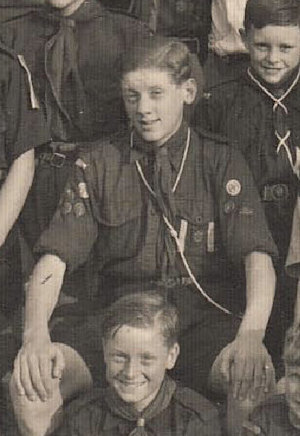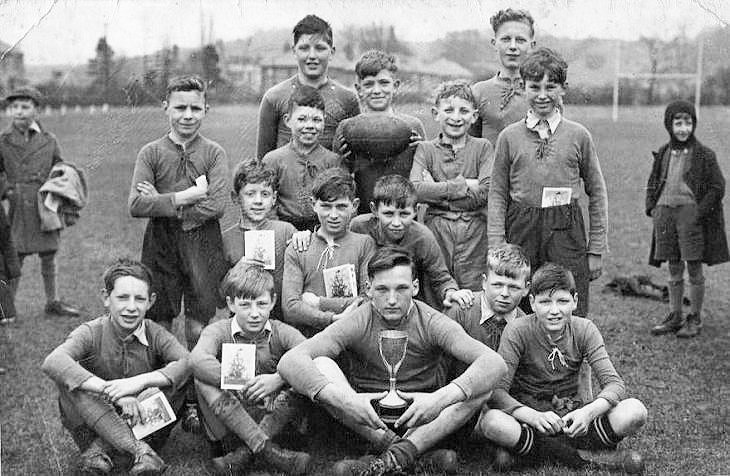 |
Les Kitchen in the Scouts in 1940s
in Pocklington |
Our family arrived in Pocklington to live with my aunt Miss Autherson in about 1940. My father was sent to work in a factory in Leeds as he was deaf in one ear and not fit for the services.
As deliveries were irregular I was sent to the tobacconist in town through the week to obtain supplies of Capstan Full Strength cigarettes for father returning home at the weekend. A weekly order for groceries was landed in at Walter Wilson’s and the goods were delivered by a boy with a large basket on the front of his bike - shades of ‘Open All Hours’. I think the home made sweets contained dried milk? All lighting was by gas which was also used to heat a large copper cauldron used for the weekly laundry.
Gas was provided by by the towns town gas works situated some way behind the railway station. Spare parts were provided by the gas show room in the town centre. On our bike tours we often visited the gas works to watch the men shovel coke into hot ovens - it was very hot!
Many people in town started keeping chickens at the outset of war. Surplus eggs were stored in jars of Isinglass - horrid material! The police given petrol visited farms in the area to ensure all was in order. They returned with a van full of bags of corn which was distributed round the town. Whispers of this reached the higher ranks of the police and a team of detectives was sent from Leeds to investigate. They found a large number of people in the town and most of the local police force was involved, so they shut up shop and returned to Leeds.
Dances were held in the town dance hall on Saturdays. A highlight being one sponsored by the Rugby Club on new years eve. It boosted the brewers profits considerably. I spent a compulsory training year before university at Warter Priory gardens. Several large group of shrubs in pots were sent down to the hall for decoration on a regular basis. On returning they were always heavily doused with alcohol - the best laid plans etc.
Spare fruit and veg were sold to Mr. Todd where the shop was at the bottom of George Street. In the early days our milk was supplied by an old milkman from Kirkland Street who brought milk on a horse and cart. He was thought to water the milk especially after he fell down and spilt all the milk on being approached by the police. Later Jackson’s run by Neville - a great friend of mine - supplied the milk. He died at a very early age.
Several boys from the town went to the Grammar School and my sister and a group of girls traveled to Beverley High School on the train each day. I understand their antics on the train were not fit to record!
I attended the Council School since my aunt was a teacher there. She had taught many of the children in the town and their parents. Belonging to the Church choir we heard the best Christmas morning sermon ever - Hey Hey it’s Christmas Day. Then all went home to prepare the Christmas dinner so happy Christmas to you all - it stuck in the memory.
By the will of Phillip Lord Wharton who died in 1696 the proceeds of his Yorkshire estates were to be devoted to the distribution of bibles. Technically the recipient should learn the 1st, 15th, 25th, 37th, 101st and 145th psalms by heart. This was ignored in my day and as a member of the choir I was given a bible in 1945.
Very early in the war the German fighters raked the Grammar School with machine gun fire thinking it was part of the aerodrome. Fortunately the bullets went over the heads of the boys sleeping in their beds. Next morning a boy wrote ‘Battered but not Beaten’ on the front fence and the head master quoted this with pride on commemoration day for several years.

Schools Cup at Pocklington Rugby Club on Easter Monday 1941, when the Council Elementary School XV won the annual rugby match against the Church of England School.
Back Row : C. Craddock and K. Wilson.
Second Row : Skelton, Hindwell, L. Anderson, J. Sunman and perhaps N. Taylor.
Third Row : L. Kitchen, D. Anderson, Anon and J. Kidd.
Seated : N. Johnson, A. Bland, D. Neasom and J. Craddock.
Photo by courtesy of Phil Gilbank (1967-74). This caption is mainly taken from ‘Pocklington at War’ by Jim and Margaret Ainscough.
The bombs were dropped along Garth End before we arrived but aunts front door and second door had a hole in it and a piece of wood was missing from the arm of a wooden chair in the ‘front room’. Someone had been sitting in the chair 10 minutes before!
When the Free French arrived opposite it was said that they fired a smoke bomb which landed down someone’s chimney further down the row. Nothing further was recorded.
It was said that when the plane crashed into Red House the lady was ironing when the nose of the plane came through the wall. She was not injured. We visited many crashed plane sites as possible to collect stray items - ammunition being the favourite. A frequent exercise was to place the live cartridges on a heap of ? facing a row of empty bottles and applying a light. The bottles were smashed and we hoped the bullets ended up in the wall - great fun!
The boys from Hymers school were credited with teaching some older town boys to make a ‘Rip snorting carbide gun’. A pipe was driven into the ground and carbide, a cartridge & electric wires were pushed in. Water was added and when the electricity was turned on the gas lit and cartridge exploded and the bullet left the pipe as though from a gun - of no use, and very dangerous!!
When I joined the scouts my patrol leader spent many evenings manning the telephone at the fire station. I went on several occasions to learn my knots. One notable scout camp was held in North Yorkshire which we reached on the back of a lorry. Prior to our visit the army had stayed there and built bunkers full of ammunition in the wood. Unknown to anyone a scout found a left over hand grenade and took it home in his kit. At home he pulled the pin from the grenade and being unable to push it back he threw the grenade down the yard behind their house where it exploded. Parents of the scouts were very angry when it leaked out.
I passed my Kings Scout Badge and with another Kings Scout from a local troupe went to Windsor to take part in a Kings Scout march past King George VI. He looked very ill. After we were taken to a large sailing boat moored in the river. On being asked to climb to the top of the mast we realised we had to leave quickly to catch the train back to York - phew!!
In the early days a favourite pastime was running up and down with a metal hoop guided with a metal hook. A local undertaker was Mr. Fielder living in George Street. He was a fine craftsman. I have a large oval mirror he made as a wedding present for my father. It is now 80 years old and in excellent condition. Following this a craze for roller skating took hold. The best place for skating was down the wide pavement in George Street until the police came from the station opposite - early health & safety.
For a period the gang from Garth End armed with sticks engaged in hand to hand fighting with the gang from the council estate from over the tall metal fence lining the bottom of our gardens. One day an air rifle was produced and a truce was declared.
Several of the boys cycled to River Head to go fishing. The only thing I recall catching were eels. I took one home and cooked it. It was awfull!!
Sledging down Chapel Hill. Several of us played in the rugby club second team, after a time at the bar we visited the fish & chip shop for chips and some scraps. Several of us earned a little pocket money helping at farms in the area with hay making, harvesting or potato picking.
Must stop!
Hand written letter sent by Les Kitchen to his childhood friend Jim Hall now in the possession of Jim's son Chris and kindly sent to A.Sefton to be placed on this website February 2021.
|

